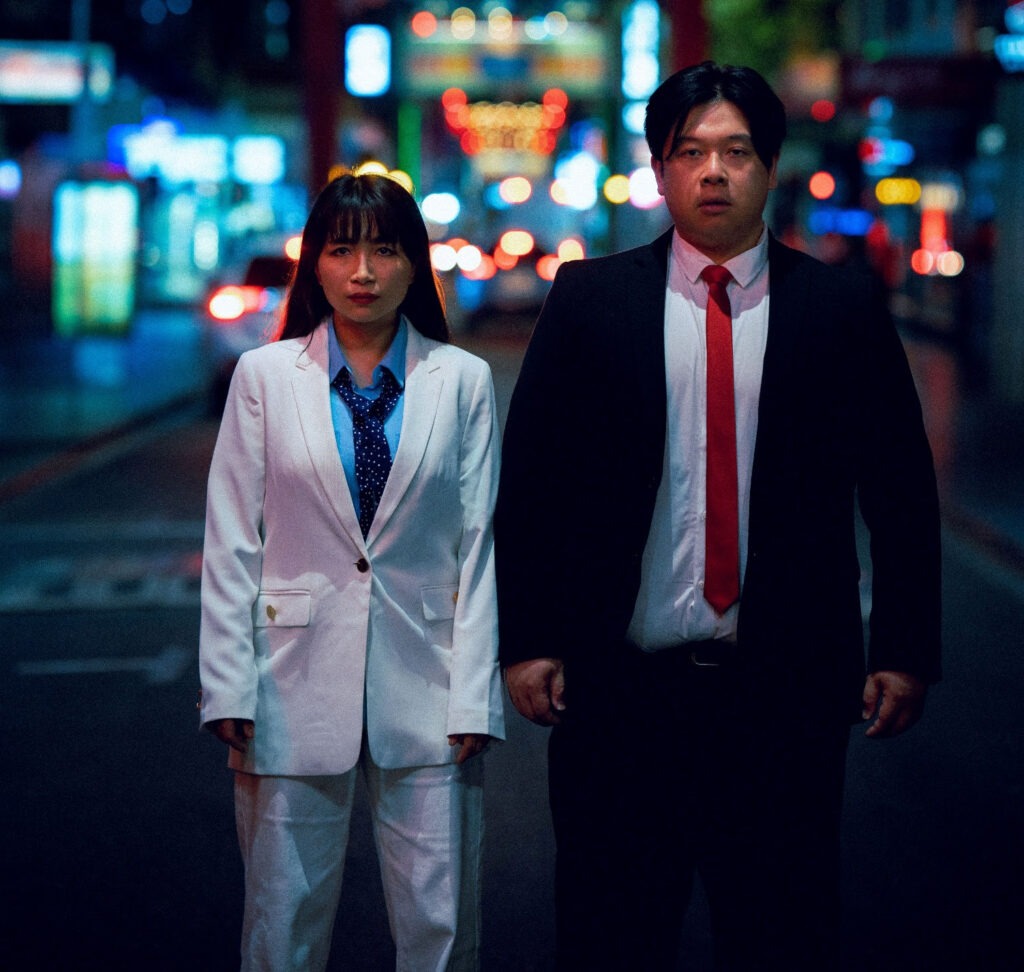
‘I ME SHE HIM’ // Wit Incorporated
‘I ME SHE HIM’ was ambitious.
Wit Incorporated have brought the first English language production of Taiwanese playwright Stan Lai’s 1998 play, ‘I ME SHE HIM’, to two stages in Melbourne’s West. Best known for his play Secret Love in Peach Blossom Land, Lai (Sehng-chuan) has been called ‘the best Chinese language playwright and director in the world’ by the BBC.
Translated by Lai himself, the script does not disappoint, seeming to have preserved most of the humour, politics and cultural nuances of a story set in Hong Kong, nearly a quarter of a century ago, for a contemporary Australian audience.
The play deals with the chance reencounter of two former lovers, tasked with travelling to a city recently returned to Chinese rule, to negotiate a business deal, ten years after they have deliberately left their idealistic younger selves behind. In the first scenes, it becomes apparent that their younger selves have not left them behind, though – More (played by Sydney actor Enoch Li) tries to have a man removed from the four-bed train compartment he has purchased for himself on the way from mainland China. The attendant seems to pretend not to see the intruder, perhaps in retaliation for More’s earlier obnoxiousness. We quickly realise, though, that only More can see or hear the Other Man (played by Berlin Lu).
Jing, played by Wit Incorporated Artistic Director Lansy Feng (who doubled as Production Manager), is similarly bothered by, though quickly more accepting of, a young woman who sits next to her in her business class seat from Taiwan. Again, only Jing can see the Other Woman (Angela Xiao), who implores her to remember who she used to be before giving her life (and seemingly joy) to the family company she is now travelling to represent at the bargaining table.
Themes of forgetting and remembering are repeated as the two main characters move closer towards their first (re)meeting through various scene changes, enabled by the cast moving beds, tables and chairs in and out of an otherwise simply dressed set, while the lights are down.
The walls of the set are hung with block-coloured drapes, which manage to convey the aesthetic of hotel lobbies, corridors and conference spaces under judicious, relatively simple lighting. A number of scenes are set in an elevator, conjured with a square of light and the projection of a large lit arrow above the actors. In one of these scenes, in which More and Jing are on stage together for the first time, a hotel staff member comes in with a trolley laden with souvenirs which a rich couple have purchased. More leans over to look at the date on one of them – June, 1989. They both seem for a moment to remember – and then turn away, and forget.
June 1989 is, of course, the date of Tiananmen Square. This date, and the theme of a difficult past which is less painful to forget, plays out through the character’s narrative arcs.
This is an ambitious text for a directorial debut, and Ren Ruidi gets many things right. The invisibility of the Other Man and Other Woman are an opportunity for early comic relief in the play, with supporting characters reacting to lines not intended for them. The supporting cast members play these moments with enough humour to leaven, but not detract, from the pathos of the script. (Special mention must go to Eldon Huang, who upstages the main cast nearly every time he is onstage as one of several quietly grumbling Attendants and Hotel staff.)
However, there are a few missteps. The aptly named More has outsized appetites – for expensive wine, Western food, sexual infidelity, and the cigarettes he perpetually lights – and is presumably in part a metaphor for the excesses of the burgeoning capitalism in China. Nevertheless, More is played almost as a caricature, making it difficult to hold sympathy with him. Li gives the character the right physicality and an amazing presence, but is allowed to deliver his lines in a quiet, rushed, naturalistic drawl that, despite the small venue, was difficult to make out most of the time. In general, the amount of projection in the delivery of lines, and the level of naturalism in acting, was inconsistent between cast members, when consistency would have better supported the script.
In addition, the interval was placed quite late in the piece, which perhaps contributed to the action in the much shorter second half seeming rushed. Despite these faults, the strength of the text, and the supporting cast, managed to carry the show through. ‘I ME SHE HIM’ was always going to be ambitious.
‘I ME SHE HIM’ performs until Saturday, 25 November 2023 at Bluestone Church Arts Space, Footscray, before dates on Friday, 1 Dec and Saturday, 2 Dec 2023 at The Bowery Theatre. For more information visit their website.






